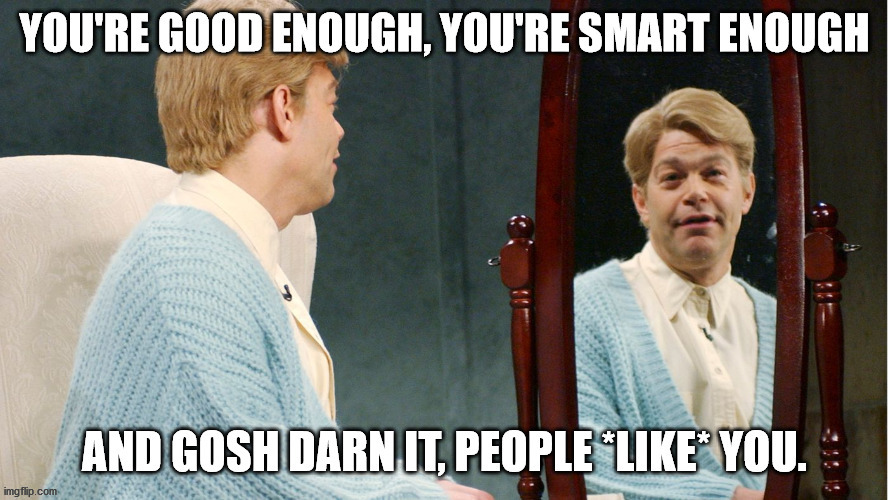
“I’m good enough; I’m smart enough, and doggon it, people like me,” simpered the host of Daily Affirmation, Stuart Smalley. A classic. These Al Franken bits on SNL poked fun at the method used and adopted by the New Thought movement in the 1800’s, by Mary Baker Eddy the founder of the Christian Scientists, and Napoleon Hill author of famed book Think and Grow Rich. Affirmations have been around for centuries, and mantras even longer.
Though chanting or repeating some silly phrase may seem trite or even ridiculous to some, my students and I have found comfort and focus in using repeated phrases, whether you want to call them mantras or affirmations. The intent is to use these repeated phrases to manage our emotions and our thoughts. I find they keep me in touch with my intentions and a higher version of myself.
Mantra, Sanskrit for “instrument or tool of the mind,” is an ancient word and refers to phrases, sounds, or prayers used in meditation to aid with concentration or spiritual connection. When I practice with Deepak Chopra or other serious yogis, mantras are often repeated as anchors in meditation practice. An example of an ancient, traditional mantra is “Om,” the universal sound of creation in Hinduism.
In modern times, the term mantra is often used interchangeably with affirmation. It serves less as a phrase to connect one with the divine and more as a means to focus on bringing about positive change or cultivating a positive inner state of peace or agency. The main difference is that mantras are used in meditation where positive affirmations can be used anytime. Practice them in the mirror while brushing your teeth or waiting in traffic or the grocery line.
When I get frustrated or disappoint with life I often will say to myself, “Life is happening for me not too me.” Or, “Everything in its right time.” When meditating I will often repeat the phrase, “I am love; I am light.” This connects me with source and my own higher nature.
Another time when affirmations have proven helpful is when an anxious or unhelpful thought loops like a skipping record in my head. For example, just this morning a dark cloud settled over me as I repeated, “I don’t know what I’m doing,” over and over. I stopped, put my open hand over my heart, flipped the phrase, and began repeating, “I’m doing my best, and I WILL get there.” This move arrested the negative loop and began to make me feel better.
To help the brain make the leap from, “I’m and idiot and I don’t know what I’m doing” it can be best to choose an affirmation that is realistic and attainable as in my example above. Yet sometimes when it comes to affirmations, I have adopted the ol’ fake it ‘til you make it approach.
Going through some physical issues and a good amount of pain after a knee replacement surgery, I once adopted the affirmation, “My body wants to be well and thrive. I’m actually in perfect health.” It was hard for me to truly believe at first, but using the words helped much more than repeatedly moaning, “This suck, and I’ll never feel better again.”
There are many situations when mantras or affirmations can be employed to change our inner state and our outer performance. With my college students I have sited the Carnegie Mellon study that using a brief self-affirmation before taking a test, doing a problem-solving activity, or other stress inducing task helped subjects eliminate the damaging effects of chronic stress on performance. Other studies can measure changes in the brain with the use of MRIs.
If you want to wake up your own neural pathways and strength the link between your conscious and unconscious mind with a little positive psychology, try writing your own affirmation. Write one not for some ideal world or future self—but for the you right now that needs a boost from the reality that you’re stewing in.
4 Simple Steps to Writing an Affirmation:
- What’s the goal or outcome you want to achieve?
- Write it in present tense and in the affirmative (use positive language) as if you have already attained said goal or outcome?
For example, don’t write, “I don’t want to worry.” Rather write something like, “Today, I am practicing being calm, relaxed, and letting shit go.” See how this is present tense, affirmative, and realistic—something your brain can get on board with.
- The shorter and sweeter the better (and easier to remember).
- Repeat your affirmation like a mantra—meditate on it.
Like SNL’s Daily Affirmations, many current spoofs exist on Instagram and TikTok that I find hilarious, but that doesn’t discount their value. However, the bottom line is positive thoughts are nice, but you must act, and consistently practice using your phrase. Then you must see yourself doing the thing, being the thing, experiencing the change you want in your life. Doggonit, you’re good enough, smart enough, and I believe in you!
